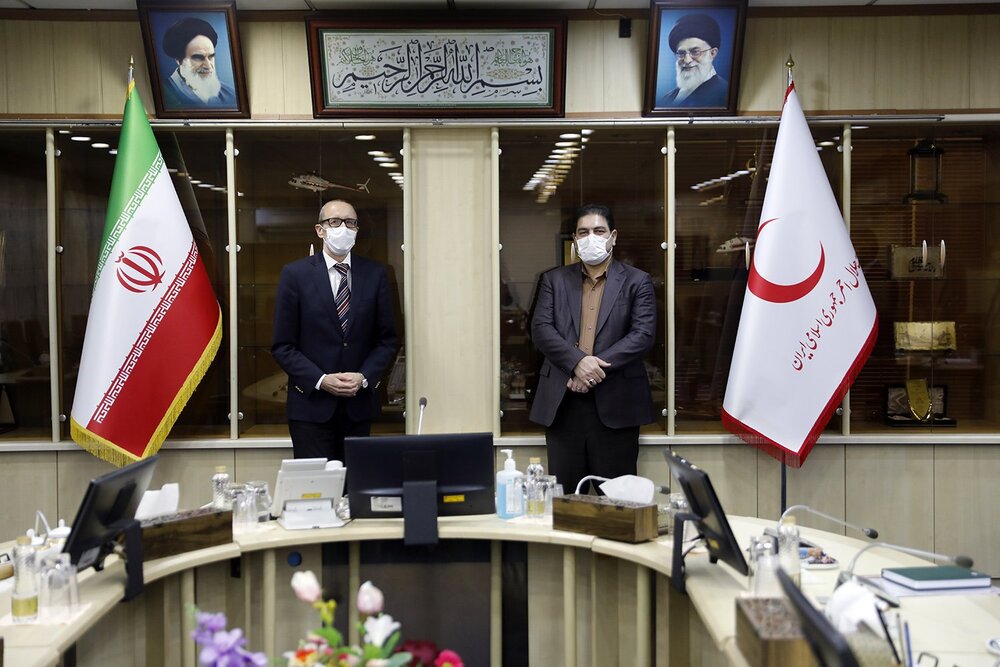IRCS, Austrian Red Cross to sign MOU on humanitarian trade

TEHRAN – The Iranian Red Crescent Society (IRCS) and the Austrian Red Cross will soon sign a new memorandum of understanding to enhance cooperation on humanitarian trade.
Karim Hemmati, the head of the IRCS, and Stefan Scholz, the Austrian ambassador to Iran, met in Tehran on Wednesday to explore avenues of mutual cooperation.
Medicine and medical equipment have always been exempt from sanctions, but unfortunately, this principle is obviously not being followed at the moment. We hope that, given the recent openings, Austria will have more humanitarian cooperation with the IRCS in this regard, Hemmati wrote on his twitter account on Wednesday.
A new memorandum of understanding between the Austrian Red Cross and the IRCS will be signed soon. Previously, we held a joint training course between the relief and rescue workers of the two countries, all of whom were influenced by the knowledge and skills of the Iranian rescuers. I hope that the training courses will continue in 2021, Hemmati twitted quoting Scholz as saying.
“Courtesy call on the head of Red Crescent to pay tribute to volunteers in support of Iran’s COVID-19 response. We appraised cooperation b/w Red Cross and IRCS, our Urban Search & Rescue external classification partnership, and C-19 services to our communities,” Scholz also wrote on his Twitter account.
So far, Swiss delivered 180,000 packages of medicine needed for cancer patients and transplant operations to Iran in February in an attempt to facilitate humanitarian trade following the implementation of the Swiss payment mechanism.
The government of the Republic of Korea also started close consultations with the United States and Iran in order to facilitate humanitarian trade with Iran with won-currency deposits made by the Central Bank of Iran (CBI) at banks in the ROK. As a result of such consultations, the ROK government resumed humanitarian trade with Iran on April 6, which was suspended after the U.S. tightened sanctions on the CBI in September 2019.
So, South Korea sent by air a shipment of medical supplies and medicine worth $500,000 needed for genetic diseases to Iran on May 29, which will mark the first case of shipment of goods for the recently resumed humanitarian trade and is expected to be followed by exports of medicine and medical equipment worth about 2 million U.S. dollars in June.
Building on the resumption of exports of humanitarian items, the ROK government will continue consultations with the U.S. and Iran on ways to broaden the scope of trade items to include not only medicine and medical equipment, which are currently the main trade items, but also foods and agricultural products, according to the Relief Web website.
Although food and medicine were claimed to be exempted from the U.S. sanctions, financial and banking sanctions have limited the life-saving medicine trade which harshly targeted the patients suffering from rare diseases.
Moreover, fears of falling afoul of Washington have restricted exports to Iran.
Exemptions for humanitarian trade (such as food, medicine, and medical equipment) have not been effective in protecting Iranian patients from access to imported medicine, such as the bandages used for patients suffering Epidermolysis Bullosa (EB), a rare genetic disease that causes painful blistering of the skin.
With the return of sanctions, over a year (May 2018-May 2019), 15 patients covered by EB Health House lost their lives, including Ava, a two-year-old girl in Ahvaz city, who died of infection and lack of skincare.
Companies exclusively producing medicine for Mucopolysaccharidosis (MPS) patients, such as BioMarin Pharmaceutical Inc. of the U.S. and a South Korean company, have refused to export these drugs to Iran, threatening the lives of 335 patients in Iran.
FB/MG
Leave a Comment